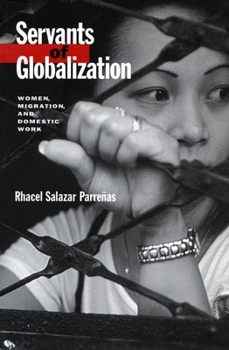Servants of Globalization: Women, Migration, and Domestic Work, First Edition
Select Format
Select Condition 
Book Overview
Servants of Globalization is a poignant and often troubling study of migrant Filipina domestic workers who leave their own families behind to do the mothering and caretaking work of the global economy in countries throughout the world. It specifically focuses on the emergence of parallel lives among such workers in the cities of Rome and Los Angeles, two main destinations for Filipina migration. The book is largely based on interviews with domestic workers, but the book also powerfully portrays the larger economic picture as domestic workers from developing countries increasingly come to perform the menial labor of the global economy. This is often done at great cost to the relations with their own split-apart families. The experiences of migrant Filipina domestic workers are also shown to entail a feeling of exclusion from their host society, a downward mobility from their professional jobs in the Philippines, and an encounter with both solidarity and competition from other migrant workers in their communities. The author applies a new theoretical lens to the study of migration--the level of the subject, moving away from the two dominant theoretical models in migration literature, the macro and the intermediate. At the same time, she analyzes the three spatial terrains of the various institutions that migrant Filipina domestic workers inhabit--the local, the transnational, and the global. She draws upon the literature of international migration, sociology of the family, women's work, and cultural studies to illustrate the reconfiguration of the family community and social identity in migration and globalization. The book shows how globalization not only propels the migration of Filipina domestic workers but also results in the formation of parallel realities among them in cities with greatly different contexts of reception.
Format:Paperback
Language:English
ISBN:0804739226
ISBN13:9780804739221
Release Date:April 2001
Publisher:Stanford University Press
Length:328 Pages
Weight:0.95 lbs.
Dimensions:0.8" x 6.0" x 9.0"
Customer Reviews
1 rating
Great book from a great scholar...
Published by Thriftbooks.com User , 18 years ago
Parreñas, a scholar admired by many whose academic training, coupled with her linguistic skills, draws inquiring minds into the largely untapped world of Filipino international migration. The book critically situates the migration from a historical-structural perspective and yet focuses on the family as the unit of analysis which must negotiate between the state regulations of both sending and receiving countries, the financial realities of citizens from poor countries of the world, and the emotional hardships faced by family members. The study, in general, is an extremely important one because it taps into what is a "female" international labor migration, bound by related expectations of gender roles, thereby encouraging readers to rethink our gendered perspective of all labor migrations. In addition, the book offers an effective assessment of the critical role of the family to young children (the focus of her subsequent book), the challenges faced by poor populations of the world, and how the global economy is structured to benefit wealthy nations of the world. I highly recommend the book and have only a small criticism: though she has carefully helped us to see the gendered inequalities faced by female international migrants, at times in the book Parreñas herself seems quite unnecessarily judgemental of the very women whose predicaments she details.






